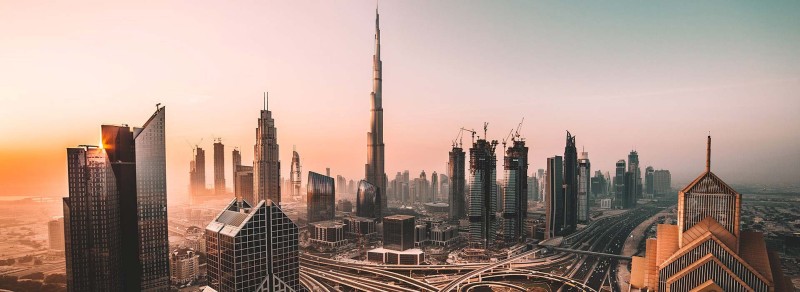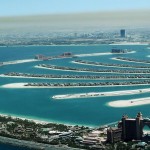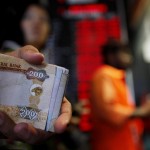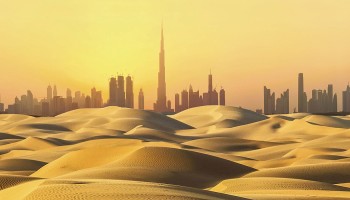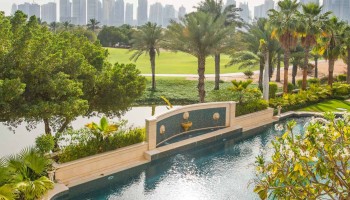The emirate of Dubai — one of seven entities that make up the United Arab Emirates (UAE) — was once among the world’s most barren, inhospitable lands.
In more recent years, it has transformed itself into an extravagant metropolis where the police drive Lamborghinis and edible gold ice cream costs US $800 a scoop.
It’s a success story that’s inextricably linked with the globalization of organized crime and corruption.
Whether it’s smuggling conflict gold out of Africa, facilitating funding for Al Qaeda and ISIS, or helping organized crime groups like India’s Dawood gang, Dubai’s secretive offshore financial system seems to play a role in almost every international corruption scandal.
“Dubai basically would not be as developed as it is right now if it didn't allow all the illicit money to end up there,” says Sayed Ikram Afzali, executive director of Integrity Watch Afghanistan, an organization that has helped document Afghanistan’s massive capital outflows to the emirate.
The Tax Justice Network labels Dubai as the ninth most secretive jurisdiction in the world, and its location halfway between London and Singapore, with more than 1.5 billion people just a three-hour flight away, makes it an ideal business hub.
So it’s no surprise that the emirate has a large and mostly legitimate business sector.
But its lack of transparency, light regulations, and seeming disinterest in the origins of the money that lands there have made Dubai a haven for organized crime groups, terrorists, despots, and many others who have profited from crime and corruption around the world — as long as they have cash and don’t embarrass the government.
As a result, it functions as a one-stop shop where the world’s wealthy can avoid taxes, dodge sanctions, launder money, or hide their assets from police or taxpayers back home.
The city’s crown jewel is its booming real estate market, which has drawn wealthy investors from around the world to enjoy not the opportunity to invest in luxury properties, but to do so in the secrecy Dubai has always afforded.
Until now.
A leaked database of property and residency data compiled by assorted real estate professionals, obtained by the non-profit group C4ADS, and provided to the Organized Crime and Corruption Reporting Project (OCCRP) pierces the veil to reveal the names of many who have sought the emirate’s secrecy.
The database contains about 54,000 addresses with 129,000 owners from 181 countries.
Many of these people are not accused of any wrongdoing, though the investments of politicians and other wealthy people on the list bear scrutiny.
The database also contains large numbers of sanctioned individuals, organized crime figures, fugitives from the law, and others whose inclusion demonstrates the extent to which Dubai has become a haven for shady characters.
A Free-wheeling Tradition
The Al Maktoum royal family, which rules Dubai, has complete control over the economy and the policies that govern it. The family’s interests are not always understood, but it does have a huge stake in maintaining the status quo.
And these policies aren’t new.
Dubai was the region’s first “free port,” with a history of deliberate laissez-faire policies that stretch back to the nineteenth century, says Christopher Davidson, a professor in Middle East politics at Durham University in the United Kingdom.
“Aiming to create a low-cost and low-tax environment for the re-exporting of goods from Asia to Europe, its business-savvy rulers have always understood the need to provide the right conditions including, when necessary, a no-questions-asked approach,” Davidson said.
The plan transformed the emirate into one of the most robust and diversified economies in the oil-dependent Middle East. This is what has attracted so much wealth.
The UAE has joined the US, Canada and Australia as one of the strongest magnets for the world’s rich, according to a study by New World Wealth, a South Africa-based research center that has been tracking millionaire migrations since 2013.
In large part due to Dubai, the UAE in 2017 had a total inflow of 5,000 millionaires, which increased the size of its millionaire population by almost 6 percent.
Some of the services available for these wealthy people include:
Money laundering through Dubai’s notoriously secretive banking system;
High-end real estate for anyone who needs to park large amounts of cash with few questions, if any, asked about its origin;
Gem and gold trading that obscures the questionable provenance of stolen or blood-drenched minerals;
Cash-based remittance systems such as hawala that allow traders to move money around the world without regulatory scrutiny;
Loosely regulated free-trade zones that allow cigarette and other smugglers to avoid customs and tariffs; and
A government that favors few regulations and enacts little oversight.
Experts say the international community lacks the political will to pressure the monarchy to address these issues.
Ultimately, it is the combination of these services all in one opaque location that makes Dubai so good to the bad.
Click below to find out more.
This story is part of the Global Anti-Corruption Consortium, a collaboration started by OCCRP and Transparency International. For more information, click here.
